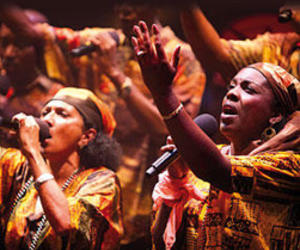The Creole Choir of Cuba
- Submitted by: manso
- Arts and Culture
- 02 / 14 / 2011

Barbican Centre, London EC2. Sunday 13 February 2011. The Creole Choir of Cuba, known in their native land as Desandann, all come from the province of Camaguey where many are of Haitian descent.
Their ancestors were forcibly brought to Cuba by French landowners after the successful revolution in Haiti led by Toussaint L'Ouverture and over the years, other Haitians came to the island seeking work or shelter and many moved to Camaguey.
They brought with them their unique Haitian Creole language and culture which they kept alive in their community.
Until the revolution of 1959, these people were regarded as second class and suffered indignities and discrimination as well as having their culture and Creole language despised by the ruling elite.
Since the Revolution, these Cubans of Haitian descent have been encouraged to take pride in their origins and portray their unique culture in music and dramatic performances.
The choir themselves are part of a larger choir of their province, which like everywhere on the island has state support and encouragement for all the arts.
The choir was started 15 years ago.
All its members are of Haitian ancestry and are uniquely in tune with their culture and language.
They travel extensively and last year spent a lot of time in Haiti after the disasters which afflicted that country, talking with and performing for the people, some of whom are family members of the choir.
On one famous occasion, they took Miami by storm despite attempts by reactionary Cuban emigre groups to ban and disrupt their shows.
According to Emilia Diaz Chavez, the musical director of the group, Fidel Castro as a child met many Haitian Cubans on his father's farm and became appreciative of their contribution to Cuba's national tradition.
Castro encouraged the choir to perform in their Haitian Creole language and all children in Camaguey schools are encouraged to learn the songs and about culture, irrespective of their origin.
At the Barbican, the choir take a packed audience to their hearts with two hours of song and dance.
Some songs are traditional and others composed by group members yet they don't need knowledge of the language to be appreciated.
Such is the group's talent and artistry that the emotions - sometimes sad and desolate, sometimes infused with laughter and elation - hold the audience absolutely rapt.
As unique as their Haitian dialect is the togetherness of the group.
Each member, classically trained, is capable of being a soloist in their own right and as one steps forward to lead, the others show total lack of ego, full respect and support.
Musically, there's a fusion of African, European and American rhythms and traditions which reflect the people of Cuba.
The six women, elegant in their colourful gowns and the four men in their red shirts perform all the songs a capella except for occasional drumming.
The singers, urging audience participation, come right to the edge of the stage and encouraging everyone to dance, clap and generally groove to their music.
A spine-tingling moment comes when the group sing the Nat King Cole standard Unforgettable in perfect English as a tribute to the audience.
After several standing ovations, the group leave the stage and walk through the audience shaking hands.
A truly outstanding performance.
Their short tour ends next week, but they return to Britain in the summer.
Not to be missed.
Touring until February 20. The choir's CD Tande-La is available on Real World Records.
By David Horsely
Source: www.morningstaronline.co.uk/index.php/news/content/view/full/
Comments